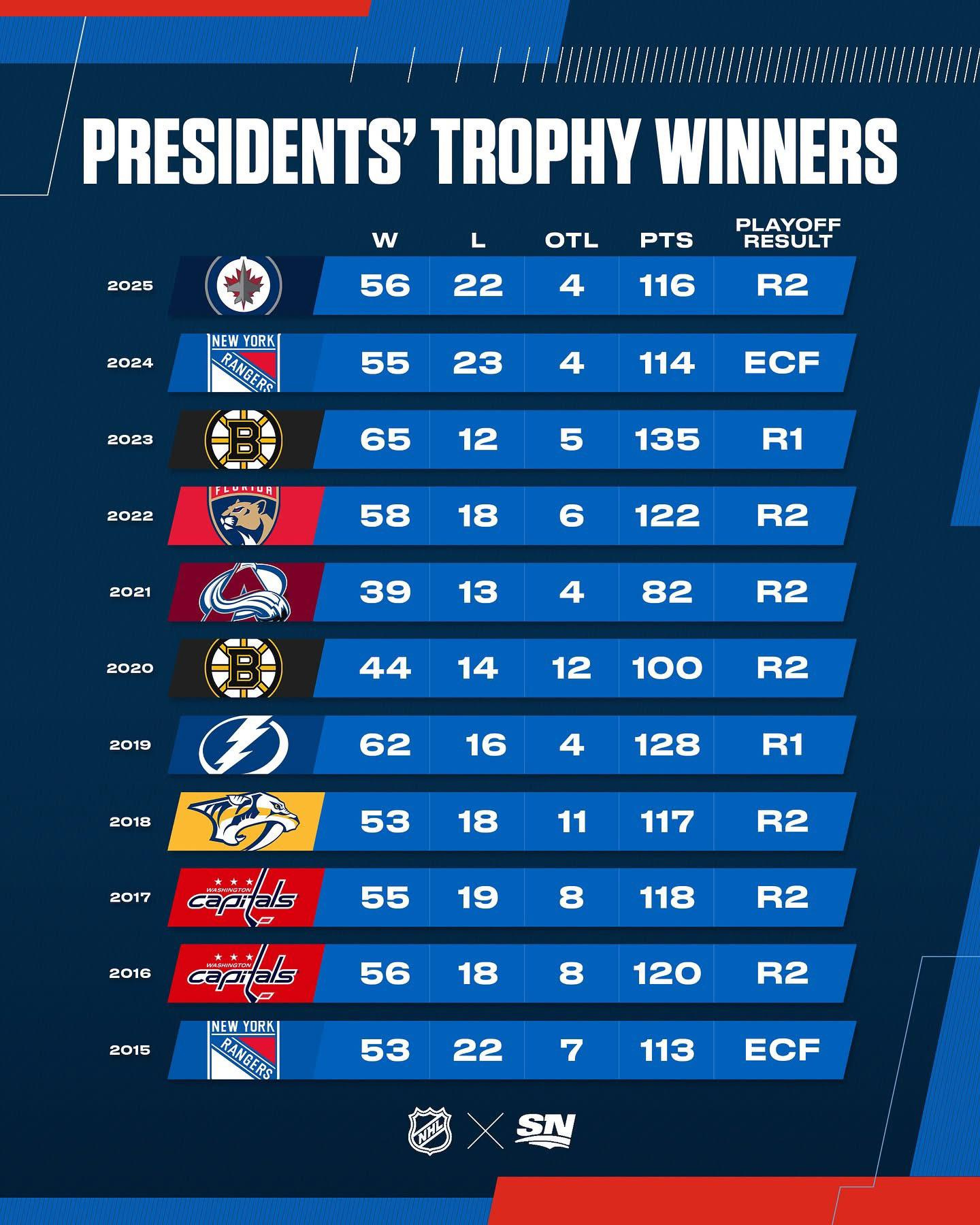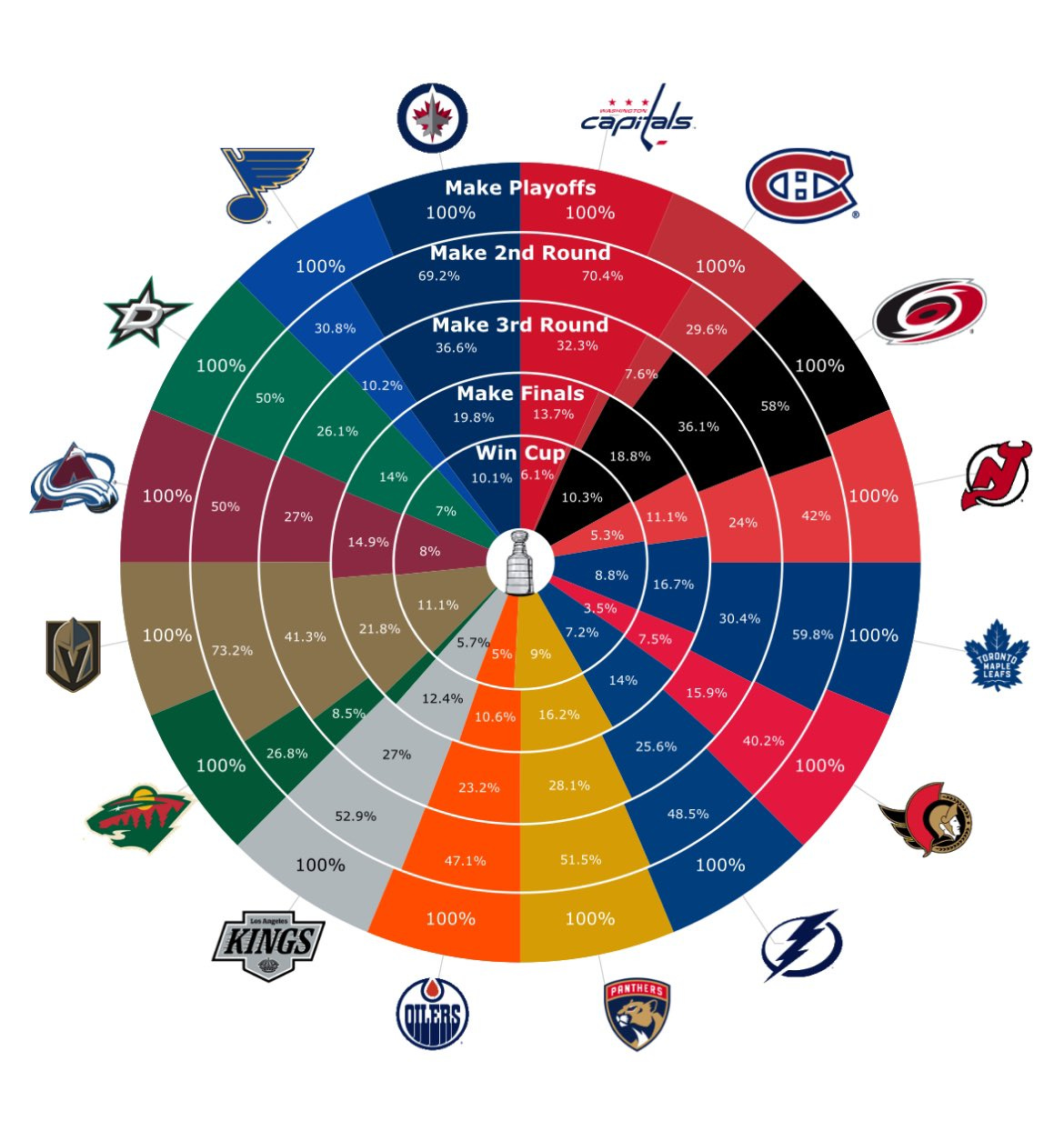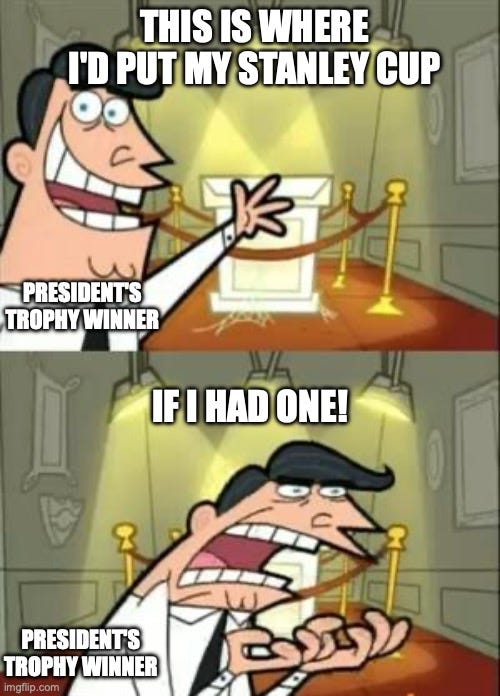Recess #12: Double, Double Toil and Trouble; First Place Earn and Playoff Stumble!
The NHL President's Trophy curse epitomizes a great sports superstition and highlights challenges with regular season structuring
On May 4th, a disturbance must have rippled through the force, since my younger sister messaged me out of the blue: “You should write about the President’s Trophy curse.” She was right, of course. At the time, the Winnipeg Jets— who had earned the trophy in 2025 by achieving the best regular season record (i.e. recorded the most points)— were on the brink of elimination in the first round of the playoffs in a game 7. Five days earlier ESPN had posted an article about how the Jets would look to overcome the “President’s Trophy curse,” and although the Jets did beat the Blues to advance, they lost to the Dallas Stars in six games in the second round. I wanted to wait to write this article until the Jets’ playoff fate was decided, and if there’s a lesson buried in its inception, it’s that I react well to unsolicited article ideas, so keep ‘em coming!
At the highest level, the so-called “curse” of the President’s Trophy stems from the perception that modern NHL teams with the best regular season performance collapse in the playoffs. Theories about why this happens abound: perhaps the best play style in the regular season doesn’t translate well to the playoffs, or the best regular season team burns out its players, or the pressure of being a 1-seed makes teams crumble. Since the trophy’s introduction in 1986, only 8 of its now 38 winners have gone on to hoist the Stanley Cup, barely a 20% success rate. Since the Blackhawks last accomplished the feat in 2013, the President’s Trophy winner had not advanced past the 2nd round 10 out of 12 times with zero championships. It really makes you think that there might be something to this curse…

The President’s Trophy curse joins a long line of sports curses that ascend to league folklore and (I think) end up being somewhat self-fulfilling because their mental and emotional toll weighs down teams. Curses can absolutely plagues teams and players. I love them. They can be borne from the extrapolation of small sample sizes or reading too much into performance variability, but sometimes they do extend into the realm of improbability levels that they make you think twice about who or what actually controls the laws of the universe. They add fun, drama, and an air of mystery to different sports franchises, players, and leagues that’s difficult to really produce in other forms of media without feeling contrived or trope-ish. As someone who saw the Red Sox finally break the Curse of the Bambino in 2004, breaking a curse also unfolds like a major religious and cultural event that transcends sports for the local hometown area.
Thankfully, sports curses extend well beyond just the greater Boston area and the ice rink. There are so many to choose from, but some of my favorites below highlight the uniqueness, absurdity, and every once in a while, the credibility associated with sports curses:
Madden Cover Curse: If you end up on the cover of the Madden video game, you should expect to do poorly or get injured next season.
Masters Par-3 Curse: Win the Masters Par-3 event and you guarantee that you will not win the actual Masters the following week!
Curse of the Billy Goat: 71 years (108 really) of the Chicago Cubs not winning a World Series, all because they kicked out a fan with a goat.
The Crucible Curse: No snooker player has won back-to-back Eorld Championships after their career first since the event was permanently moved to the Crucible Theater in Sheffield, UK.
The Aaron Ramsey Curse: Whenever soccer player Aaron Ramsey scores, an global persona like Steve Jobs or Paul Walker, or Ted Kennedy dies.
Nick Castellanos’ Reverse-Curse: Seemingly whenever there is an international tragedy, Phillies player Nick Castellanos hits a home run.
There’s nothing I love more than a good, and slightly comedic curse that presents a statistical anomaly so great it can’t be explained. The short list of some of my favorites just scratches the surface and I highly recommend skimming the Wikipedia list of sports curses linked above if you want a good chuckle. But now, let’s try to demystify the President’s Trophy Curse since it got the ball rolling in the first place. I wrote a long set of articles about the balance of luck and skill in sports, and while I’ll try to not repeat too many talking points from that article, I do want to highlight the simple fact that rare, or statistically implausible occurrences do actually happen every day, and their rarity I think makes them appear more visible creating a confirmation bias for their prevalence that overshadows the underlying mechanisms leading to the effect.
Luck & Skill in Modern Sports, Pt. 1
Back in 2018 during my senior year of undergrad, I was fortunate enough to have an advisor in professor Peko Hosoi from MIT amenable enough to let me complete a mechanical engineering (ME) thesis on a slightly tangential topic from most traditional ME topics. I wanted to examine how luck and skill affected the outcomes of professional
In the case of the President’s Trophy Curse, though, I think a major culprit for the increasing effects of the curse has remained relatively clear: the NHL’s new playoff format. Since 2013, the NHL has implemented a division-based quadrant style playoff format that can have two of the best teams in a conference meet in the second round of the playoffs, and often makes first round matchups more difficult as well if the four divisions in the NHL are unbalanced. The NHL’s best-of-7 playoff format does lend itself to higher skill expression that would generally indicate better teams should win more often, but when the teams are as evenly matched as two top teams in the NHL, it’s difficult to consistently win. Those winning chances dwindle even further when trying to battle through several rounds of potentially even matchups early in a bracket. To highlight this point, hockey analytics site Money Puck only gave the Winnipeg Jets a 10% chance to win the Stanley Cup at the start of the playoffs after they dominated the regular season:

Before the new playoff format was introduced, the President’s Trophy winner had hoisted the cup in 8 of 27 seasons, a 30% win rate with the longest drought being four seasons (four separate times). Since the new format was introduced, it’s been 12 seasons and counting since a President’s Trophy winner actually went on to win the championship. Given the 30% win rate in the first 27 seasons of the President’s Trophy’s existence, a binomial probability calculation suggests that 12 years without a winner only has a 1.3% chance of occurring if all else stays equal. As mentioned before, this can happen! 1-in-100 events happen 1-in-100 times, but the low probability does suggest that the new playoff format likely contributes to the curse itself.
A variety of other factors like increased league parity, player health, the grinding nature of the playoffs, and home rink advantages definitely play into the actual mechanisms driving the President’s Trophy Curse, but the impact of the new playoff format appears to be quite stark on its own. What’s more interesting are the incentives that it generates for teams in the league. Apart from a results-oriented analysis on President’s Trophy winners crashing out early, it does indicate that the value of a high seed in the playoffs is not as valuable as it is in a sport like the NFL where you get a full-round bye, or the NBA where 1-seeds and 2-seeds have won 68/78 championships!
I’m not suggesting that the NHL should re-configure their format to provide as much value as the NFL (a bye presents a crazy advantage in an injury-heavy sport), but perhaps some middle ground exists that doesn’t incentivize teams to not perform at their top level in the regular season. If I was the coach or GM for a modern NHL team, I would constantly rest players in the regular season and making late-season trades to prepare for a run from a 3-seed as opposed to squeezing out a couple extra regular season wins. I don’t think that strategy would be very popular among the other teams in the league or fans, but hey, you have to play with the hands you are dealt and I doubt the Panthers fans are complaining much as they just went up 2-1 in the Stanley Cup final this year!
I am beginning to digress, and starting to become the jaded statistician that contorts themself into a pretzel to undermine the purity of a sports curse. You (or I) could spend dozens of hours writing dissertations about the mechanisms and likelihood of various sports curses, and perhaps that’s why I love them— they always seem to embody the improbable or seemingly impossible to the point that they drive illogical behavior and analysis. Their overall aura can be attractive and divisive at the same time.
At the end of the day, maybe a 1-seed will win the Stanley Cup the next five seasons in a row and the President’s Trophy Curse will be broken. If that ends up being the case, it’ll fall into a long line of sports curses I’m glad I got to experience and subsequently see be lifted. Professional sports are nothing without interesting storylines and superstitions, so I secretly hope this curse lasts a little longer (unless the Bruins dominate a regular season soon).
There’s the bell!




